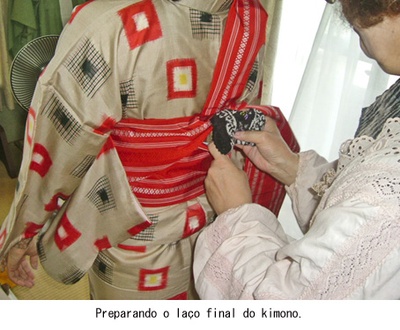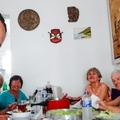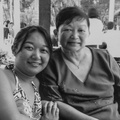Ainda não vi nenhum homem, mulher ou criança obesos na cidade onde moro. Com tantos pratos gostosos e bem apresentados, fico pensando como é que conseguem se manter esbeltos, mas reparando bem nos tamanhos das porções dos produtos nos supermercados, noto que os japoneses são contra o desperdício, incentivando também o uso de refis. O país não possui uma área geográfica ampla, então acredito que se não houvesse preocupação alguma com o meio ambiente, o país só teria a perder e conseqüentemente caminharia para a autodestruição.
Começo a entender alguns dos comportamentos de minha família no Brasil. Na casa de alguns parentes meus, sempre há livros empilhados, pouco espaço livre e até guardam coisas que nunca vão usar. Aqui no Japão, parece que também é assim. Imagino que pelo pouco espaço que possuem, aliado ao fato de sempre pensar em evitar o desperdício, acabam guardando muitas coisas em casa, no escritório ou no laboratório.
Os doces são bem apresentados e caprichados. Os bolos confeitados têm decorações delicadas e detalhes incríveis. As cores chamam nossa atenção. Como não são tão doces, ficamos com vontade de comer mais ainda. Bem que meus amigos brasileiros haviam alertado sobre o quanto é comum o fato de mulheres engordarem no Japão. Estou tendo que lutar constantemente contra minha vontade em saborear de tudo...
As mulheres japonesas são muito chiques. Claro que existem exceções, mas geralmente usam maquiagem e calçam sapatos com saltos altos mesmo precisando andar de ônibus. Andar de salto alto em São Paulo para pegar ônibus? Eu evitava ao máximo. Porém, como no Japão as avenidas são bem asfaltadas e não tem buracos, os ônibus não balançam tanto. Inclusive, não é costume levantar-se antes do ônibus parar completamente e o motorista utiliza um microfone para avisos e os faz antes de qualquer movimento, por exemplo, fechar a porta, dar partida no motor, virar à esquerda ou à direita e parar no ponto. Eles prezam bastante pela segurança dos passageiros.
Imaginava que vestir um kimono fosse desconfortável. Somos forçadas a ficar com as costas posicionadas corretamente, mas não chega a doer nem a ficar incômodo. As japonesas tomam cuidado com cada detalhe e acessório. Usamos tamanco, enfeitamos o cabelo e carregamos uma bolsinha, com estampa combinando com o tecido do kimono.
Eu tinha uma idéia diferente do comportamento dos professores e dos alunos em uma sala de aula. Imaginava que seguissem um sistema hierárquico bem rigoroso, que os alunos não pudessem de jeito nenhum chegar atrasados e que fossem muito estudiosos. Chegando aqui é que pude ver que as coisas não são bem assim. Os alunos atrasam-se sim e até dormem nas aulas. Outro dia, reparei que o professor estava olhando com freqüência para mim. A classe só tinha cinco alunos por ser uma aula optativa. Olhei ao meu redor e notei que todos estavam dormindo! A aula tinha passado a ser particular, ou seja, apenas para mim. Não que no Brasil não aconteça, mas imaginei que aqui fosse mais rigoroso. Estranhei outras coisas.
Durante as aulas, os professores demonstram bastante paciência e compreensão. Um dos meus professores sempre espera os alunos terminarem de copiar para apagar a lousa. Ele se lembra também de não escrever com giz rosa porque as pessoas que sentam no fundo têm dificuldade em enxergar.
Em minha turma da aula de japonês, há muitos koreanos e chineses. Os chineses estão mais acostumados e têm facilidade em aprender os kanjis, mas têm dificuldade em pronunciar algumas sílabas. Não consigo entender às vezes o que eles dizem por causa da pronúncia.
Outro dia, fui pesquisar preços de malas de viagem. A atendente devia ter percebido que sou estrangeira e gastou quase uma hora me atendendo, mesmo eu tendo avisado que não ia comprar e que estava apenas pesquisando preços. Sinceramente, na época em que morei em Mie-ken, não me senti tão acolhida como desta vez e até agora pergunto-me se são diferenças regionais ou simplesmente o fato de ser bolsista e não dekassegui, é que faz a diferença. Talvez uma mistura dos dois.
Eu não gostava muito de beisebol. Na verdade, detestava e não via a menor graça. Mesmo assim, li as regras básicas na Internet e fui a um jogo de um time famoso de Fukuoka, o Softbank Hawks, que infelizmente perdeu. O estádio “Fukuoka Yahoo! Dome” é muito bonito. Uma das coisas estranhas por lá foi a abundância de obentôs. Isso não é nada comum no Brasil e chega a ser um pouco deselegante. Os vendedores de cerveja carregam galões nas costas e passam gritando entre os corredores. Enquanto isso, às vezes algumas bolinhas são atiradas para fora do campo e os torcedores sortudos conseguem pegá-las como lembrança. Quando o jogo está terminando, os japoneses começam a comprar e a encher bexigas gigantes para soltá-las no ar, fazendo um barulho bem alto - “fiuuuuuu”. Acabei percebendo que este esporte está realmente enraizado na cultura do país, mas ainda não consegui gostar tanto quanto eles.
Depois disso, fui assistir um jogo de futebol. O time de Fukuoka perdeu, mas mesmo assim eu adorei, pois vi dois jogadores brasileiros em campo e pude torcer por eles, gritar seus nomes para incentivá-los. Sou brasileira, acho que fica fácil compreender por que gosto mais de futebol do que beisebol.
Todos sabem que é costume japonês retirar os sapatos antes de entrar nas casas ou nos laboratórios de pesquisa. Em alguns banheiros públicos, também. Fui um dia experimentar roupas e cometi a gafe de entrar de sapatos no provador. A funcionária, achando que não havia ninguém no provador, abriu a cortina e... Que vergonha! Sorte que eu estava vestida e então ela me alertou sobre os calçados. Os sapatos ao lado de fora do provador servem para indicar que há gente utilizando o local. Gafe de uma brasileira no outro lado do mundo.
Notes:
1. Obentô é a marmita japonesa. Os japoneses costumam caprichar em seu preparo e montagem, afinal de contas, para os japoneses, a apresentação é sempre importante.
© 2009 Silvia Lumy Akioka








